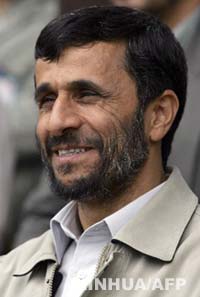
Iranian President Mahmoud Ahmadinejad, seen here on May
3, has written to US President George W. Bush to "propose new ways" to resolve a
quarter-century of tensions between the arch-foes. -Xinhua/AFP
Iranian President Mahmoud Ahmadinejad has sent a letter to his U.S.
counterpart George W. Bush over Iran's disputed nuclear program, as some
countries continued to call for a diplomatic solution.
In an interview with Turkey's private NTV television channel on Monday,
Iran's chief nuclear negotiator Ali Larijani, who is on a visit to Turkey, said
Ahmadinejad's letter "could lead to a new diplomatic opening."
The letter was delivered to Bush through the Swiss embassy to Iran, Iranian
government Spokesman Gholam Hossein Elham said.
Ahmadinejad, who has vowed never to give up right to peaceful nuclear
technology, proposed new solutions to the international problems in the letter,
the spokesman said.
Larijani arrived in Ankara on Monday morning to seek support over Iran's
nuclear issue as the UN Security Council is considering a draft resolution
proposed by Britain and France that obliges Iran to freeze all uranium
enrichment activities or face sanctions.
Iran was expecting Turkey to help Iran explain its sincerity onthe nuclear
issue, said Larijani, who affirmed that Iran did not have any military
intentions with its nuclear program. "
"Iran has been cooperating with the International Atomic Energy Agency (IAEA)
and thousands of international experts have inspected the nuclear facilities in
Iran," he added.
Turkish Prime Minister Recep Tayyip Erdogan on Monday reiterated that Iran's
nuclear issue should be solved through diplomatic means.
In a meeting with Larijani, Erdogan said that Iran had the right to peaceful
nuclear technology, but urged transparency over the Iranian nuclear program in a
bid to appease international concerns.
"Iran has the right to have nuclear energy for peaceful objectives, so does
every country. But it should be transparent," Erdogan was quoted by Anatolia
news agency as saying.
Last week, Erdogan conveyed the same message to Iran's President Mahmoud
Ahmadinejad when the two leaders met in Azerbaijan's capital of Baku on the
sidelines of a regional summit.
"Turkey believes that no one can object to nuclear technology for peaceful,
humanitarian aims," Erdogan told Ahmadinejad. "But, of course, no country in the
world will approve the proliferation of nuclear weapons."
French Foreign Minister Philippe Douste-Blazy called on the UN Security
Council to send a "firm and unified signal to convince Iran to return to the
negotiating table."
"Not only has Iran not replied to the questions, but it has accelerated its
enrichment program," Douste-Blazy said in an interview in the French daily Le
Figaro in its Monday edition.
"The Security Council resolution should strengthen the authority of the IAEA
and give obligatory force to its demand for the suspension of activities linked
to enrichment, including that for research purposes. We must respond to Iran in
a united, firm and rapid manner," he added.
The U.S. White House said on Monday that Ahmadinejad's letter to Bush did not
address international concerns about Iran's nuclear program.
"It doesn't appear to do anything to address the concerns of the
international community," said White House spokesman Scott McClellan, who is
traveling with President George W. Bush to Florida.
"There are a number of concerns that the international community has with the
(Iranian) regime and the letter doesn't appear to do anything to address those
concerns," McClellan said.
Foreign ministers of the United Nations Security Council's five permanent
member states plus Germany were to meet in New York later Monday to map out a
common strategy to force Iran to halt its uranium enrichment activities.



